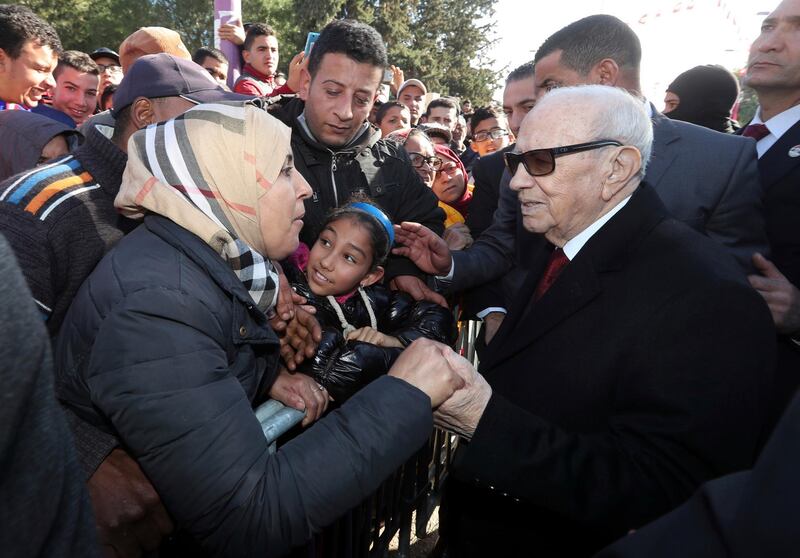On a warm Monday afternoon, the coffee shops of Ettadhamen, a district of Tunis, are packed. But what is good business for the coffee shops is also indicative of the dire economic situation Tunisia currently finds itself in.
Those drinking coffee are all jobless young men, reminiscing over a revolution that many feel has left them behind. Riots have hit this impoverished district of Tunis over the evenings of the past week, and a glimpse inside the busy coffee houses reveals much about why, seven years after the Jasmine Revolution that toppled former president Zine El Abidine Ben Ali, Tunisians have once again taken to the streets.
Tunisia's youth unemployment rate is a staggering 35 per cent, and Ettadhamen is ground zero. It was the residents of areas like this who turned out en masse to support the Jasmine Revolution in 2011, but it is also here that, seven years on, people feel most forgotten.
As nationwide protests gripped the country last week in response to a new austerity budget introduced at the start of the year, clashes broke out in Ettadhamen, shops were looted, and some even took to throwing Molotov cocktails at riot police. Signs of the clashes still remain — a pickup truck chugs along the main road, carrying the black chassis of a burnt-out car torched in the clashes a few nights ago.
Local Nassad Hamoud, 24, is fortunate to have a job in a nearby shop. But, he admits with a chuckle, “I was involved at little [in the clashes] … life is just too expensive here”.
“Look around," he adds. "All the coffee shops are full of young men, they should be working, there are so many unemployed [people] here."
____________
Read more:
[ Tunisia's Jasmine Revolution commemorations clash with anti-government protests ]
Editorial: Ben Ali anniversary offers a moment for Tunisians to reflect
[ Tunisians spill into the streets to demand better living conditions ]
____________
Though the new austerity measures may have been the catalyst for the recent unrest, the grievances of protesters run deeper, Mr Hamoud says. “It’s not just the budget, it’s daily life, it’s food. We can’t afford it”.
Of the violence that broke out at the protests, Mr Hamoud says: “There were some people who came just to steal. They deserved to be arrested, they were taking anything they could sell for money. But the majority were out because they are so desperate.”
He adds that some of those arrested were as young as 13.
Youssef Chabani, 25, who was stood on the street with Mr Hamoud, is studying for a master’s degree in economics, something he says he decided to do because he knew "for sure" he would not find a job.
“II couldn’t find a job after my bachelors,” he adds.
So symbolic is Ettadhamen of Tunisia’s economic problems that it was to this area that president Beji Caid Essebsi dispatched himself on Sunday in a gesture seen as a response to the unrest. The visit, during which he opened a new youth centre, was his first ever to the neighbourhood.
Outside the youth centre, Mr Essebsi told media: "We feel for you, these are our families." His government also announced a number of welfare reforms in an effort to quell the protests.
But Mr Chabani is not impressed. “[His visit] means nothing to me," he says. "He will come here, he will bring nothing and leave. People are starving and he is opening a youth centre, it shouldn’t be a priority. These are the same clumsy reforms Ben Ali would have made”.
Nor was he convinced by the promised reforms. “It’s just talk, they will do nothing, I’m sure of that. It’s seven years since the revolution and it’s the same system."
Ettadhamen residents were further angered when president Essebsi refused to meet with any of them.
“They had dozens of people sweeping the streets on Saturday before his arrival, the street is the cleanest it has ever been," says 37-year-old Mouna Hassabi, who runs a sandwich shop on the same street as the youth centre. "They’ll never be swept again, I’m sure”.
Ms Hassabi's observations are right; the streets are spotless.
Outside the youth centre also stands a billboard with the photos of eight local “martyrs” — all men killed during the 2011 protests. The board is an everyday reminder of the revolution that once filled the neighbourhood's residents with hope but now fills them with the regret of missed opportunity.
At a coffee shop down the road sit five unemployed men, passing time on their phones and chain-smoking. All five were part of the protests that overthrew former president Ben Ali in 2011 and dozens of their friends have been arrested in late night clashes over the past week. “I've lost count how many,” says one of the men, 48-year-old Mounir Mohammed.
“It was the poor people joining the revolution that put this government in power, but they don’t care about us anymore,” he adds.
“The president came here yesterday, he did a speech, and didn’t speak to any of us. We don’t need a youth centre, we need to work, we need jobs, we need to eat."
“Things are so expensive, we don’t even think about buying fruit anymore. Sometimes I’ll take a selfie with the fruit,” jokes another of the men, 28-year-old Tariq Mugherbi.
His friend Aymen Mohanna adds, “I’m 20-years-old, and I’ve never had a job”.
Mr Mohammed believes Mr Essebsi only came to the neighbourhood because he wants to win support ahead of the next presidential election due next year.
"We will be forgotten until the next political leader decides they want our vote. This is all a mask. I’m just waiting for the president’s next big lie.”
Between drags on a cigarette, he warns, “It may be quieter now, but there will be more protests, just wait a few months".
"I guarantee you, the problems have not gone away”.






